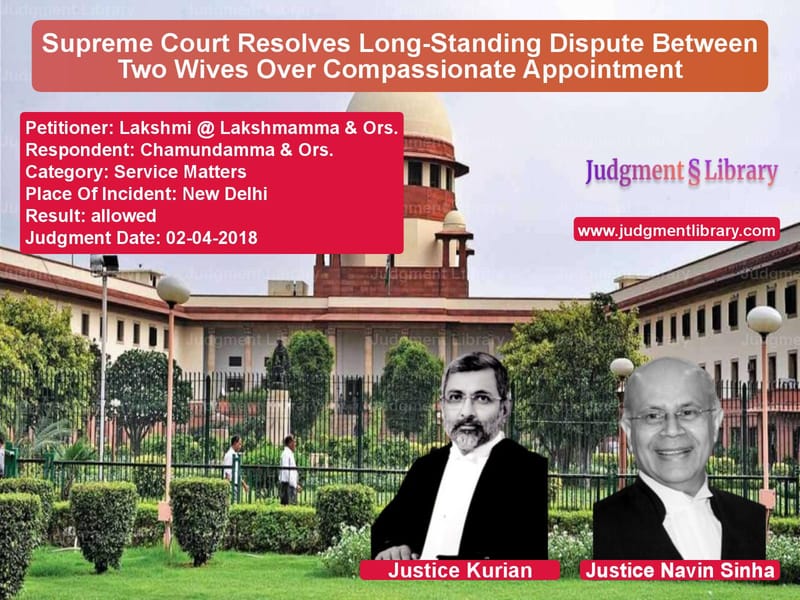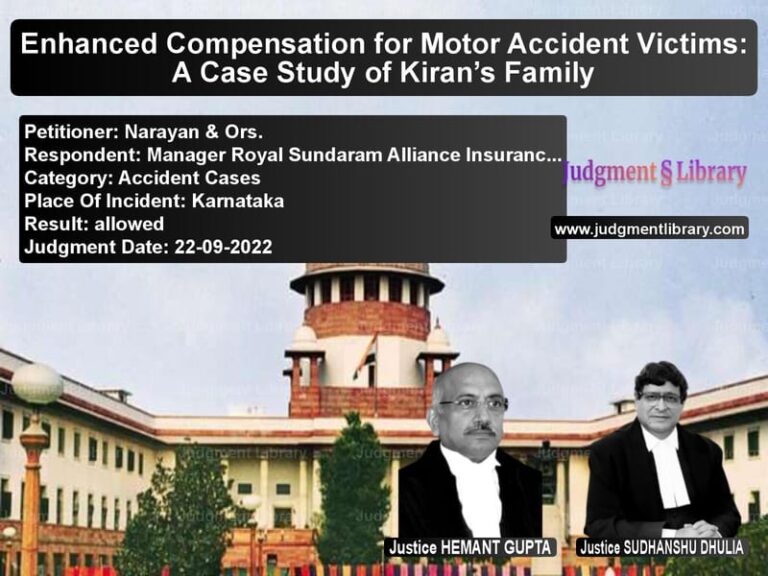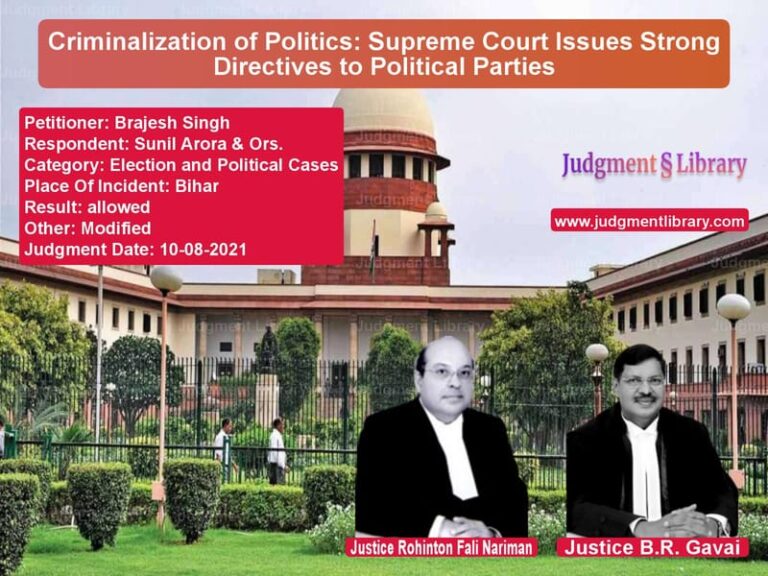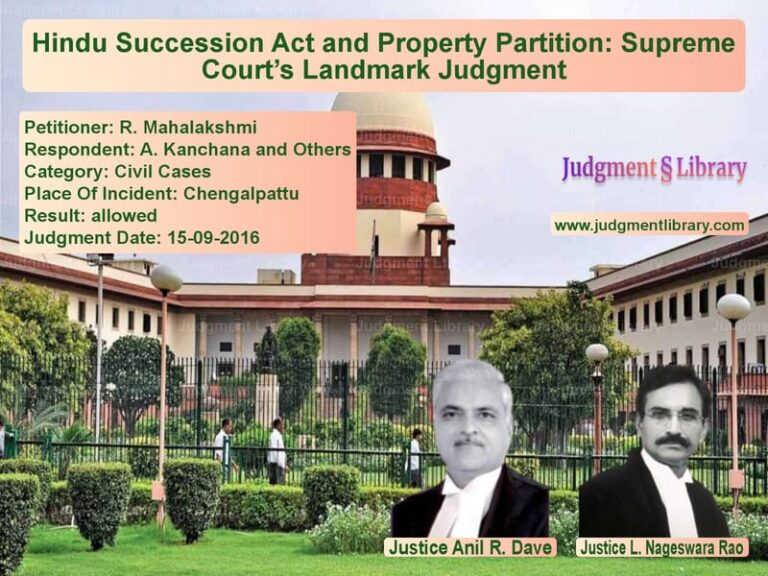Supreme Court Resolves Long-Standing Dispute Between Two Wives Over Compassionate Appointment
The case of Lakshmi @ Lakshmamma & Ors. v. Chamundamma & Ors. revolves around a prolonged dispute between two women, both claiming to be the wives of a deceased man, Javaranaika. The dispute had been pending in various courts for several years and reached the Supreme Court, which offered a suggestion to resolve the matter amicably. The judgment focuses on how the dispute regarding the distribution of benefits and properties of the deceased was settled, with one of the wives receiving the benefit of compassionate appointment and the other receiving all other benefits.
Background of the Case
The legal dispute began after the death of Javaranaika, with both Lakshmi @ Lakshmamma and Chamundamma claiming to be his rightful wife. The case had gone through several judicial levels, and after much deliberation, the matter was brought to the Supreme Court. The core issue was the division of the deceased’s benefits and property between the two women, both of whom had legitimate claims under personal laws and customs.
The dispute had been going on for an extended period, causing significant emotional and financial distress to both parties. The Court had to find a fair and just way of settling the matter, taking into account the complexities surrounding inheritance, compassionate appointment, and the respective legal standing of both women.
Proposal for Amicable Settlement
During the proceedings, the Supreme Court suggested a possible amicable resolution to the dispute. A suggestion was made by the bench, led by Justice Kurian, proposing that one of the women could be granted the benefit of compassionate appointment, while the other would receive all other rights and property claims. After discussions and negotiation between the parties, both women agreed to this suggestion. The following terms were proposed and accepted:
- The benefit of compassionate appointment would be given to Respondent No. 3, Revanna Naika J., who was associated with Chamundamma.
- All other benefits, including property and inheritance claims, would go to Appellant No. 1, Lakshmi @ Lakshmamma.
- Respondent No. 4 was instructed to process the compassionate appointment for Respondent No. 3 within two weeks from the production of the Court’s judgment.
- The ongoing pension in favor of Lakshmi @ Lakshmamma would be continued as per the original arrangement.
Arguments by the Appellant (Lakshmi @ Lakshmamma)
The appellant’s counsel argued that:
- As the legally recognized wife of Javaranaika, Lakshmi @ Lakshmamma had rightful claims to all property and benefits.
- The matter had caused unnecessary delays and the family needed closure, both emotionally and financially.
- The Court’s suggestion of allocating compassionate appointment to Chamundamma’s side was fair, but all other entitlements should be given to the appellant, given her marital status and the long duration of the dispute.
Arguments by the Respondent (Chamundamma)
The respondent’s counsel countered by stating:
- Chamundamma, as the second wife, also had legal claims to the deceased’s estate under customary and personal laws.
- Although the respondent accepted the compassionate appointment as a form of resolution, it was critical that Chamundamma’s role in the family and her contributions to Javaranaika’s life were recognized in a meaningful way.
- The case involved many complications, and the division of property should not undermine the fair claims of the respondent.
Supreme Court’s Judgment
1. The Court’s Role in Facilitating Amicable Settlement
The Supreme Court took a proactive approach by facilitating the possibility of an amicable settlement. Justice Kurian Joseph, delivering the judgment, noted:
“The dispute between the parties has gone on for several years. In light of the prolonged litigation and the emotional toll it has taken, it is prudent to offer an amicable resolution that can provide both parties with a sense of justice and closure.”
2. Granting Compassionate Appointment
In deciding who should be given the benefit of compassionate appointment, the Court reasoned that the surviving spouse who had lost her husband and was in need of immediate financial support should be prioritized. Justice Kurian observed:
“Compassionate appointments are meant to help the surviving family members cope with the immediate loss of a breadwinner. As such, the Court has decided to grant the benefit to Revanna Naika J., taking into account the principle of fairness.”
3. Division of Property and Benefits
The Court concluded that all other benefits, including property, should go to Lakshmi @ Lakshmamma, as she had the stronger legal claim to the estate based on marriage. In this context, Justice Navin Sinha remarked:
“The distribution of property must adhere to the principles of equity and justice. While we recognize the hardship faced by both parties, the law mandates that property entitlements should primarily go to the legally recognized spouse.”
4. Implementation of the Court’s Direction
The Court issued clear instructions for the implementation of its decision. The relevant authorities were asked to process the compassionate appointment within two weeks of the judgment’s issuance, ensuring swift action to alleviate the financial distress of the respondent. Furthermore, the Court stated:
“We direct Respondent No. 4 to act expeditiously and complete the compassionate appointment within the prescribed period. We also ensure that the pension for the appellant will continue without hindrance.”
Final Outcome
The Supreme Court resolved the dispute by agreeing to the settlement terms that both parties had mutually accepted. The outcome was as follows:
- Respondent No. 3 (Revanna Naika J.) was granted the benefit of compassionate appointment.
- Appellant No. 1 (Lakshmi @ Lakshmamma) was awarded all other benefits, including the property rights.
- The pension arrangement for Lakshmi @ Lakshmamma would continue without any interruptions.
- Respondent No. 4 was directed to process the compassionate appointment within two weeks of the judgment’s production.
Key Takeaways from the Judgment
- The Supreme Court emphasized the importance of resolving family disputes amicably, especially when they have been prolonged.
- Compassionate appointments can serve as a remedy for surviving spouses, ensuring financial stability after the loss of a family breadwinner.
- While marital status is an important consideration, the Court also took into account the fairness of the settlement for both parties.
- The legal complexities of property distribution and entitlement were addressed with an equitable approach, ensuring that both parties received a fair share.
Conclusion
This case is a testament to the importance of judicial intervention in family disputes and the Court’s ability to facilitate a fair and amicable resolution. By considering both the legal entitlements and emotional distress of the parties, the Supreme Court crafted a balanced solution that provided immediate relief and long-term closure for both women involved in the dispute. The judgment not only offers clarity on the rights of surviving spouses but also highlights the role of compassion in judicial decision-making.
Petitioner Name: Lakshmi @ Lakshmamma & Ors..Respondent Name: Chamundamma & Ors..Judgment By: Justice Kurian, Justice Navin Sinha.Place Of Incident: New Delhi.Judgment Date: 02-04-2018.
Don’t miss out on the full details! Download the complete judgment in PDF format below and gain valuable insights instantly!
Download Judgment: Lakshmi @ Lakshmamma vs Chamundamma & Ors. Supreme Court of India Judgment Dated 02-04-2018.pdf
Direct Downlaod Judgment: Direct downlaod this Judgment
See all petitions in Employment Disputes
See all petitions in Public Sector Employees
See all petitions in Pension and Gratuity
See all petitions in Judgment by Kurian Joseph
See all petitions in Judgment by Navin Sinha
See all petitions in allowed
See all petitions in supreme court of India judgments April 2018
See all petitions in 2018 judgments
See all posts in Service Matters Category
See all allowed petitions in Service Matters Category
See all Dismissed petitions in Service Matters Category
See all partially allowed petitions in Service Matters Category







